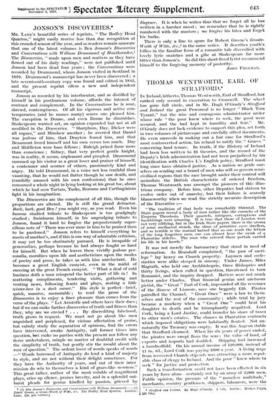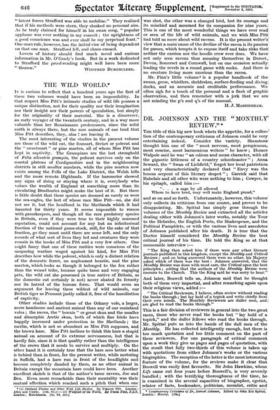THOMAS WENTWORTH, EARL OF STRAFFORD.*
IN Ireland, hitherto, Thomas Wentworth, Earl of Strafford, has ranked only second in execration to Cromwell. The wheel has gone full circle, and in Mr. Hugh O'Grady's Strafford and Ireland the great Proconsul is no longer " Black Tom Tyrant," but the wise and courageous administrator under whose rule "the poor knew where to seek, the good were secured, and the bad kept in humility and fear." Mr. O'Grady does not lack evidence to support this plea, set forth in two volumes of picturesque and carefully sifted documents. He even succeeds in making out a fair case for Strafford's most controverted action, his refusal to ratify the " Graces " concerning land tenure. In truth, if the History of Ireland had been less written to fit theories, and the record of the
Deputy's Irish administration had not been prejudiced by his identification with Charles I.'s English policy, Strafford must long since have obtained justice. As a nation we pride our- selves on sending out a brand of men who will so govern semi- civilized regions that the race brought under their control will assimilate the British characteristic of ordered freedom.
Thomas Wentworth was amongst the pioneers of thii illus- trious company. Before him, other Deputies had striven to evolve order out of anarchy, but their failure is scarcely blameworthy when we read the strictly accurate description of the Executive :—
" The tradition of that body was remarkably Oriental. The State papers reveal a body of men rather like the eunuchs of the Empress Theodosia. Their quarrels, intrigues, corruptions and backbitings were amazing. It is true that those of London were not very edifying, but in the Irish State papers there is the aroma of some mediaeval stench, the slime of primitive cave dwellers, and so terrible is the mutual hatred that, as one reads the letters of the long forgotten men, one can almost hear the swish of ii Florentine stiletto. The man who entered those portals carried his life in his hands."
It was not merely the bureaucracy that stood in need of reformation. As Bramhall complained, "the paw of sacri- lege" lay heavy on Church property. Laymen and eccle- siastics were alike steeped in simony. Under James, Miles Magrath, who held one Archbishopric, three Bishoprics and thirty livings, when called in question, threatened to turn Romanist, and the inquiry dropped. Matters were not much better under Charles. That financial genius and unctuous pietist, the " Great" Earl of Cork, impounded all the revenues of the diocese of Lismore, save one beggarly 120. Pirates patrolled the Channel. "Great Ones" were a law to them- selves and the rest of the community ; while trial by jury became a mockery when a "Great One" could beat his daughter to death and be triumphantly acquitted. Lord Cork, lacing a Lord Justice, could transfer his share of taxes to other men's estates. The clauses in Plantation contracts which imposed obligations were habitually flouted. Not un- naturally the Treasury was empty. It was this Augean stable that Strafford cleansed. When his six years of power ended, the pirates were swept from the seas : the value of land, of exports and imports had doubled. Shipping bad increased a hundredfold. On his annual income of 220,000, instead of 11 6s. 8d., Lord Cork was paying WOO a year. A living wage from recovered Church stipends was attracting a more reput- able class of clergy to Ireland. And the poor " knew where to seek" for justice and protection. Such a transformation could not have been effected in six years by force alone—certainly not by an army of 2,000 men. Public opinion, the pressure of the " nameless multitude," merchants, country gentlemen, shippers, labourers, were the
• Strafford and /reland. By Hugh o'Grady. 2 yols, Dublin Hodges FIggla, 108.1
"latent forces Strafford was able to mobilize." They realized that if his methods were stern, they cloaked no personal aim. As he truly claimed for himself in his swan song, "popular applause was ever nothing in my conceit ; the uprightness of a good conscience was and ever shall be my perpetual feast." One-man rule, however, has the initial vice of being dependent on that one man. Strafford fell, and chaos ensued.
Lovers of history should find much novel and curious information in Mr. O'Grady's book. But in a work dedicated to Strafford the proof-reading might well have been more



























































 Previous page
Previous page